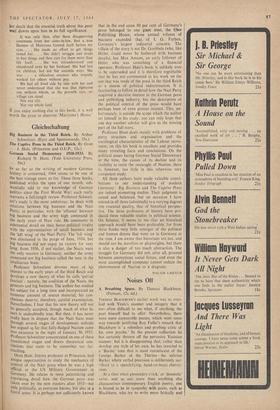Gleichschaltung
Big Business in the Third Reich. By Arthur Schweitzer. (Eyre and Spottiswoode, 55s.), IN so far as the writing of modern German history is concerned, 1964 seems to be one of The best vintage years so far. These three books, Published within the span of one month, sub- stantially add to our knowledge of German Politics since the First World War; each really warrants a full-length review. Professor Schweit- zer's study is the most 'ambitious; he deals with relations between big business and the Nazi Party; in particular, with the 'alliance' between big business and the army high command in the early years of Nazi rule. He comments in substantial detail on their fierce political rivalry With the representatives of small business and the 'left wing' of the Nazi Party. The 'left wing' Was eliminated in the purge of June, 1934, but big business did not enjoy its victory for very long; from 1936, if not' earlier, the Nazis were the only masters in Germany; neither the army command nor big business called the tune in the totalitarian State.
Professor Schweitzer devotes most of his interest to the early years of the third Reich and develops a new theory of what he calls 'partial fascism': namely, the coalition of the Nazis, the generals and big business. The author has studied his subject for a long time and incorporated an iMmense amount of source material; his con- clusions deserve, therefore, careful examination. Nevertheless, I fear that his new theory will not be generally accepted, though much of what he says is undoubtedly true. But then, it has never really been in dispute that the Nazi State went through several stages of development; nobody has argued SQ far that fully-fledged Nazism came into existence in the night of January 30, 1933. Professor Schweitzer concentrated on one of these transitional stages and draws theoretical con. elusions that seem to be somewhat too far- reaching.
Oron Hale, history professor at Princeton. had unique opportunities to study the mechanics of control of the Nazi press when he was a high official in the US Military Government in Germany. He relates in most painstaking and convincing detail how the German press was taken over by the new masters after 1933—not Only politically, as everyone knows, but also in a literal sense. It is perhaps not sufficiently known
that in the end some 80 per cent of Germany's press belonged to one giant trust, the Eher Publishing House, whose annual volume of business exceeded that of 1. G. Farben, Germany's largest industrial concern. The villain of the story is not Dr. Goebbels (who, like Hitler, Could never be bothered with business details), but Max Amann, an early follower of Hitler who was something of a financial operator. Professor Hale's book is unlikely ever to be superseded and it is therefore regrettable that he has not commented in his work on the use that was made of the press in the third Reich as a means of political indoctrination. It is fascinating to follow in detail how the Nazi Party acquired a decisive interest in the German press and publishing industry, but the description of the political control of the press would have perhaps been of even greater interest. This, un- fortunately, is outside the scope which the author set himself in his study; one can only hope that one day another scholar will give us the missing part of the full story.
Professor Hunt deals mainly with problems of party structure and organisation and the sociological characteristics of the Labour move- ment; on this his book is excellent and provides many revealing facts and conclusions. On the political issues facing German Social Democracy at the time, the causes of its decline and its inability to resist the onslaught of Nazism, there is, however, too little in this otherwise very competent study.
All three authors have made valuable contri- butions to our understanding of modern Germany: Big Business and The Captive Press are indeed pioneering studies. Their judgment is sound and balanced, but on occasion I have missed in all three (admittedly to a varying degree) one essential quality, that of historical perspec- tive. The three professors of history have pro- duced three valuable studies in political science. On balance, it seems to me that an historical approach would have been preferable, for from these books very little emerges of the political and human drama that went on in Germany at the time. I am aware that historians are not, and should not be, novelists or playwrights, but there is also a danger of too much abstraction. The struggle for 'Germany did not, after all, proceed between anonymous social forces, and even the most accomplished computer cannot reduce the phenomenon of Nazism to a diagram.
WALTER LAQUEUR
























 Previous page
Previous page